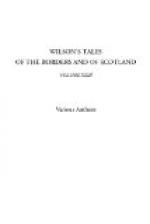If Balgarnie had been a reader, he might have remembered Waller’s verse—
“That eagle’s fate and mine
are one,
Which on the shaft that made
him die
Espied a feather of his own,
Wherewith he wont to soar
so high.”
So Mysie gained her plea, and the marriage with Anabella, for whom she had embroidered the marriage gown, was dissolved. How matters progressed afterwards for a time, we know not; but the Scotch know that there is wisdom in making the best of a bad bargain, and in this case it was a good one; for, as the Lady of Balgruddery, Mysie Craig did no dishonour to George Balgarnie, who, moreover, found her a faithful wife, and a good mother to the children that came of this strange marriage.
THE TWIN BROTHERS.
William Sim was the son of a feuar in the southern part of Dumfriesshire, who, by dint of frugality, had hoarded together from three to four hundred pounds. This sum he was resolved to employ in setting up his son in business; and, in pursuance of this resolution, at the age of fourteen William was bound as an apprentice to a wealthy old grocer in Carlisle; and it was his fortune in a few months to ingratiate himself into the favour and confidence of his master. The grocer had a daughter, who, though not remarkable for the beauty of her face or the elegance of her person, had nevertheless an agreeable countenance, and ten thousand independent charms to render it more agreeable. She was some eighteen months older than William; and when he first came to be an apprentice with her father, and a boarder in his house, she looked upon him as quite a boy, while she considered herself to be a full-grown woman. He was, indeed, a mere boy—and a clownish-looking boy too. He wore a black leathern cap, edged and corded with red, which his mother called a bendy; a coarse grey jacket; a waistcoat of the same; and his trousers were of a brownish-green cord, termed thickset. His shoes were of the double-soled description, which ought more properly to be called brogues; and into them, on the evening previous to his departure, his father had driven tackets and sparables innumerable, until they became like a plate of iron or a piece of warlike workmanship, resembling the scaled cuirass of a mailed knight in the olden time; “for,” said he, “the callant will hae runnin’ about on the causeway and plainstanes o’ Carlisle sufficient to drive a’ the shoon in the world aff his feet.” When, therefore, William Sim made his debut behind the counter of Mr. Carnaby, the rich grocer of Carlisle, and as he ran on a message through the streets, with his bendy cap, grey jacket, thickset trousers, and ironed shoes, striking fire behind him as he ran, and making a noise like a troop of cavalry, the sprucer youngsters of the city said he was “new caught.” But William Sim had not been two years in Carlisle when he began to show his shirt collar; his clattering




